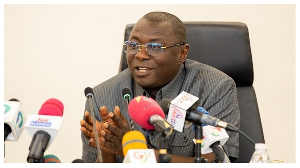Director of the Institute of Statistical, Social and Economic Research (ISSER) at the University of Ghana, Professor Peter Quartey has called on the government to limit human contact in the country’s revenue mobilization by introducing automated and computerized tax collection systems.
According to him, human contact in revenue collection usually forms grounds for bribery and corruption which denies the country of needed revenue.
“Road tolls have to be reviewed but not just reviewed we have to automate the tolling system, however, ensuring efficiency in tax collection through digitization and limiting human interface or discretion is the sure way to go” he said.
Speaking at a review of the 2021 budget statement and economic policy on March 23, 2021, organized by UG-ISSER, which aimed at identifying signals and projecting possible outcomes of the budget, Professor Quartey reiterated that government does not receive the 50% from road tolls as it should due to human interference and disloyalty.
“It is my personal view that even the government is not getting the 59% of what he is supposed to get from road tolls. We need to automate the process like other countries have done.
Human interference is supposed to be minimized to a longer extent because we have situations where people make money without giving receipts and how do we account for this money. Many of us even drive through, we pay without taking receipts which is very bad” he added.
Also at the event, the managing director of the Agricultural Development Bank (ADB), Dr. Kofi Mensah said the 5% tax on profit slapped on Ghanaian banks will in a long run be beneficial for the country’s economic development.
“I do not think the 5% tax on profit on banks will cause any harm but will in a long run be beneficial for the country’s economic development because banks I think have become way stronger” he noted.
Regional News of Saturday, 27 March 2021
Source: universnewsroom.com

















